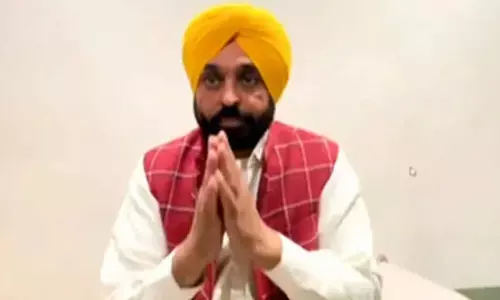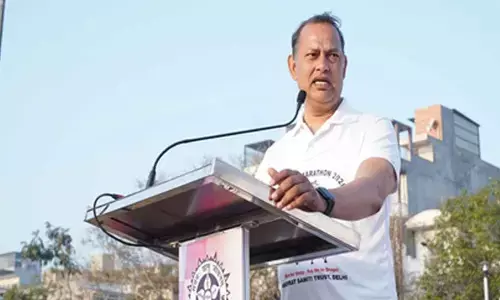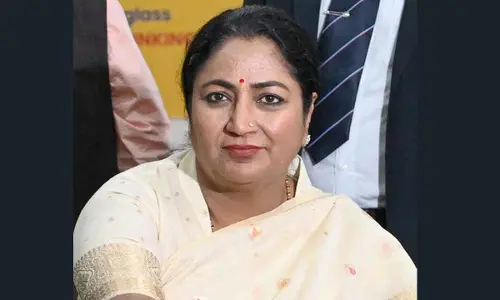He is the only equal among unequals

Leo Tolstoy wrote this a long time ago and it is very apt today when the world is abuzz discussing and dissecting the 100 days of the Narendra Modi government.
'The distance you have gone is less important than the direction you are going today'
.jpg) Leo Tolstoy wrote this a long time ago and it is very apt today when the world is abuzz discussing and dissecting the 100 days of the Narendra Modi government.
Leo Tolstoy wrote this a long time ago and it is very apt today when the world is abuzz discussing and dissecting the 100 days of the Narendra Modi government.
Modi's supporters seem a little defensive when they put forth the argument that 100 days are too little a time for any government to make a substantial difference in politics or leave an impact on society. His critics shout from the rooftops that Modi is more show than substance. It's true that 100 days are not long enough to pass judgment on whether Modi has failed or passed as prime minister.
But to borrow from Tolstoy, these 100 days do tell 100 stories about the 'direction' in which the government is moving towards. One direction which seems to emerge very clearly is that Modi appears a lot more like Indira Gandhi than Atal Bihari Vajpayee.
Vajpayee was the first non-Congress leader to become prime minister. During his days as prime minister and later, he was compared to Jawaharlal Nehru, India's first prime minister.
Like Nehru, Vajpayee was inclusive, accommodative, compassionate and kind-hearted. He was a politician with whom one could get into an argument and have a difference of opinion without bothering about the repercussions on one's future and career.
Nehru embodied the idealism of the freedom movement and carried that forward in governance too.
Vajpayee represented a different Bharatiya Janata Party. The BJP then was imbued with a different kind of idealism. It was a time when it used to boast about being 'a party with a difference.' It used to speak about 'Chaal, Charitra, Chehra' (Behaviour, Character, Impression). It used to speak about 'shuchita' (purity) in politics. Both Nehru and Vajpayee were idealists and soft, but the same could not be said about their successors. Indira Gandhi was made of different mettle though she had been trained by her father in the art of politics. Unlike Nehru, Indira had to struggle hard to become the undisputed leader of the Congress party. She was ruthless in putting an end to all rivals. Similarly, Modi too had to fight for his place. Vajpayee was a natural leader of the party and there was no opposition to his eminence except in the early 1990s. Even then his leadership was not challenged.
Modi, like Indira Gandhi, had to struggle. At one point he was to be removed as the chief minister of Gujarat. That would have been political death. He faced a very hostile media and it was taken for granted that being the divisive and polarising figure that he was, he could never take over leadership of the party.
Like Indira Gandhi, he belied all the predictions of political pundits. He fought his way up to become the prime minister. If like Nehru, Vajpayee was an idealist, then Modi is a realist like Indira. Both of them are the logical progression of the historical journeys which their parties have traversed over the years. I am not surprised by the grammar of Modi's politics. His politics is pure power politics. It is defined by the struggle that he has gone through.
Like Indira Gandhi, he is always suspicious about the people who surround him. He is lonely as he does not trust anyone. And he will not allow anyone to challenge his superiority, be it individual or institutions.
He is not the first among equals. He is the only equal among the unequal.
If one carefully analyses his 100 days, these imprints are very clearly visible. Three directions can easily be identified. There are hints of:
- Collapse of the Cabinet system;
- The beginning of the unsettling of the Constitutional balance;
- The brazen disruption of the social ecosystem Indira Gandhi was said to be the only male member of her Cabinet. Her Cabinet was a rubber stamp. She imposed the Emergency without any formal or informal discussion in the Cabinet. The President was asked to sign the proclamation and the Cabinet was informed later to endorse the decision. In 100 days Modi has made his ministers glorified clerks. They can't even appoint officers and secretaries. Even Home Minister Rajnath Singh, the second in command, is left with no say in the Cabinet Committee on Appointments.
Gopal Subramaniam's thwarted appointment as a Supreme Court judge and former Chief Justice P Sathasivam's appointment as the Kerala governor are pointers in this direction.
The debate about the removal of the collegium system to appoint judges also borders on the same lines. The removal of an honest officer like Sanjeev Chaturvedi as the chief vigilance officer at the All India Institute of Medical Sciences tells the same story.
BJP leaders make dangerous communal statements every day which vitiates the atmosphere and disrupts communal harmony. From the ramparts of the Red Fort, Modi declared that there should be a moratorium on communalism for ten years, but BJP-Rashtriya Swayamsevak Sangh leaders are not listening to him.
If Modi wanted, this would immediately stop. Unfortunately, he is keeping quiet and that he has not uttered a single word is suspicious. I just want to say that those who don't learn from history are destined to repeat it.
Modi should learn from Indira Gandhi's examples that such games are easy to begin, but impossible to control. But when has Modi really bothered about history?








